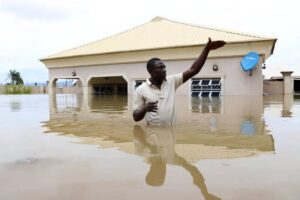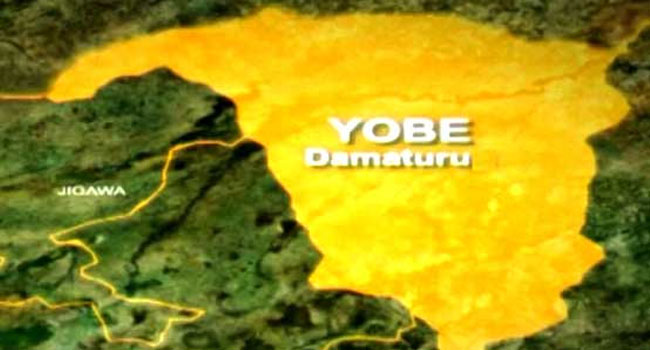In a series of devastating events that have severely impacted Yobe State, heavy rainfall lasting more than 12 hours on Friday has resulted in the collapse of a crucial bridge at Jumbam, in the Bursari Local Government Area. This bridge, situated along the Damaturu-Dapchi federal road, was a vital connection for the region. The incident comes just three days after the Potiskum-Gashua road in Yobe State was similarly cut into two, underscoring the growing challenges posed by extreme weather and aging infrastructure.
The Jumbam bridge served as an essential artery, connecting several local government areas in both northern and eastern Yobe to Damaturu, the state capital. With this bridge now rendered impassable, the consequences for local communities are far-reaching. According to Bala Mohammed, a driver from Babbangida, the headquarters of the Tarmuwa Local Government Area, the collapse occurred in the early hours of the day, catching residents and commuters by surprise. The heavy rains that caused the bridge to give way are a stark reminder of the vulnerability of critical infrastructure in the face of natural disasters.
 The loss of the Jumbam bridge is particularly troubling because it was the alternative route after the earlier collapse of the Potiskum-Gashua road. These roads are not just thoroughfares; they are lifelines that support the movement of people, goods, and services. The situation has effectively cut off nine local government areas, including Machina, Nguru, Karasuwa, Bade, Jakusko, and Yusufari in northern Yobe, as well as Geidam, Yunusari, and Bursari in eastern Yobe. These communities are now isolated, with residents relying on canoes to reach the state capital or being forced to take an arduous journey through Hadejia in Jigawa State, a detour of more than 500 kilometers.
The loss of the Jumbam bridge is particularly troubling because it was the alternative route after the earlier collapse of the Potiskum-Gashua road. These roads are not just thoroughfares; they are lifelines that support the movement of people, goods, and services. The situation has effectively cut off nine local government areas, including Machina, Nguru, Karasuwa, Bade, Jakusko, and Yusufari in northern Yobe, as well as Geidam, Yunusari, and Bursari in eastern Yobe. These communities are now isolated, with residents relying on canoes to reach the state capital or being forced to take an arduous journey through Hadejia in Jigawa State, a detour of more than 500 kilometers.
The implications of these road collapses extend beyond mere inconvenience; they have brought economic and agricultural activities in the affected areas to a standstill. Farmers, who rely on these roads to transport their produce to markets in Damaturu and beyond, are now faced with the grim reality of seeing their crops spoil. This disruption is expected to have a ripple effect on food supply chains, potentially leading to shortages and increased prices.
Local businesses, already grappling with economic challenges, are also suffering. The flow of goods and services has been severely disrupted, impacting traders who depend on these roads to transport merchandise. For a region that is largely agrarian, the collapse of these critical infrastructures threatens not just livelihoods but also food security.
Residents have expressed their frustration and despair over the current situation. Many fear that without prompt action, their communities will face prolonged hardship. “We are stranded,” one local resident lamented. “This road is our only connection to the outside world. Now we are cut off, and no one seems to have a solution.”
In response to these developments, local authorities have acknowledged the gravity of the situation and the need for urgent intervention. Efforts are reportedly underway to address the immediate challenges posed by the collapsed roads and to restore connectivity. However, the scale of the destruction has raised questions about the readiness and capacity of the government to respond effectively.
Yobe State Governor, Mai Mala Buni, has reportedly directed relevant agencies to assess the damage and provide immediate solutions to restore access. In a statement, the governor emphasized the importance of restoring these critical infrastructures to alleviate the suffering of the affected communities. He called for collaboration between state and federal governments, as well as international partners, to address the root causes of these recurrent infrastructure failures.
While these assurances are welcome, many residents remain skeptical. There is a growing sense of frustration over what is perceived as a lack of proactive measures to prevent such disasters. Community leaders have called for a more robust and comprehensive approach to infrastructure development and maintenance, particularly in areas prone to flooding and other natural disasters. They argue that investment in resilient infrastructure is crucial to mitigating the impact of extreme weather events, which are becoming increasingly frequent due to climate change.
The recent incidents in Yobe State are symptomatic of a broader challenge facing many parts of Nigeria and indeed, the world. Climate change is leading to more intense and unpredictable weather patterns, including heavy rainfall that can overwhelm existing infrastructure. In many cases, roads, bridges, and other critical facilities were not designed to withstand the kind of environmental stress they are now facing.
Experts have long warned of the need to invest in resilient infrastructure that can adapt to changing climatic conditions. This includes not only building new roads and bridges but also retrofitting existing ones to make them more durable. The events in Yobe State highlight the urgent need for a comprehensive national strategy on infrastructure resilience, one that takes into account the realities of climate change and its impact on vulnerable communities.
As Yobe State grapples with the immediate fallout from the collapse of its roads, the need for a long-term solution becomes increasingly evident. This solution must involve a combination of immediate relief efforts to restore connectivity and comprehensive planning to prevent future occurrences. The federal and state governments must work together, with support from the private sector and international partners, to invest in infrastructure that is both resilient and sustainable.
Community involvement is also crucial. Local residents and leaders should be engaged in planning and decision-making processes to ensure that infrastructure projects meet the specific needs of their communities. This participatory approach can help build trust and ensure that interventions are both effective and sustainable.
In conclusion, the road collapses in Yobe State are a wake-up call. They remind us of the critical importance of infrastructure in supporting economic and social development, and the devastating impact when it fails. By taking decisive action now, we can not only address the immediate challenges facing Yobe State but also build a more resilient and prosperous future for all. As we mourn the losses and hardships caused by these events, let us also seize the opportunity to make lasting changes that will protect our communities and secure their future.




